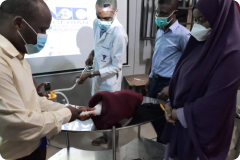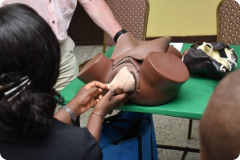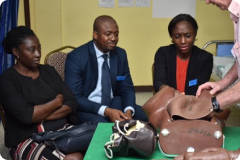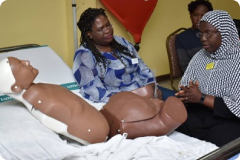Our evaluation framework and theory of change guides the implementation of digitally enabled PHCs in Lagos State.
Evaluation of the Lagos State PHC digitisation Project is an evaluation research being conducted in Lagos State. The evaluation is scheduled to take place from July 2023 through June 2026
Aim: Providing robust evidence using the best possible implementation research approach on the feasibility, effectiveness, and cost effectiveness of the suite of digital tools being implemented within PHCs in Lagos State
To achieve these objectives, this study draws on a range of methodological approaches, innovative tools, and primary and secondary sources of data and is comprised of five complementary sub-studies as shown below:



The objective of this study is to assess the feasibility and acceptability of a birth companion (BC) intervention designed to increase the presence of birth companions during labour, delivery, and the immediate postnatal period.
The primary aim is to evaluate the effect of a BC intervention package on the uptake of birth companionship during these stages. The primary outcome measure is the proportion of women at participating health facilities who have a BC accompany them during labour, childbirth, and within 24 hours post-delivery.
The study is designed as a two-arm, parallel, cluster-randomised controlled trial (cRCT), stratified by state and facility birth volume. It includes 12 public health facilities in Nasarawa State and 12 in Kano State.
This study employs a mixed-methods approach, incorporating both quantitative and qualitative data collection methods. The study population includes eligible women who deliver at the participating facilities, their birth companions, healthcare providers working in antenatal care, labour and delivery wards, and unit managers assigned during the study period.
The study was conducted over 15 months.



The primary objective is to describe where G-ANC participants (i.e., women who attended at least one meeting) gave birth, disaggregated by place of childbirth (i.e., the same health facility where they attended G-ANC, another facility, or home) and recruitment method (e.g., phone, physical tracing)
The study findings will increase understanding of how G-ANC influences care-seeking for childbirth. They will inform how complementary G-ANC is with primary health care strengthening in Nigeria and new emerging global MNH strategies.
This is a mixed methods exploratory study to describe where G-ANC participants gave birth,
particularly whether they gave birth in the same facility where they participated in G-ANC.
Eligible G-ANC participants, defined as pregnant women who attended at least one G-ANC meeting, will be identified in 52 facilities. Based on the quantitative survey findings, in-depth interviews (IDIs) will be conducted to understand better the factors influencing women’s place of childbirth and how the G-ANC intervention influences that decision.
The study duration was 5 months.



Study Title: Effectiveness of Community Group Antenatal Care (G-ANC) as a Service Delivery Model in Gombe State.
This is a hybrid type I implementation research study design employing a mixed method approach, consisting of: a pragmatic cluster randomised controlled trial and a qualitative study.
It is aimed at assessing the effect of the community G-ANC program on the coverage and quality of key Maternal and Newborn Health innovations, satisfaction with care and acceptability of the program in select communities across two local government areas in Gombe State.
The study is being conducted in three phases as described below



An implementation research and effectiveness study to co-design, test, and scale a guideline for screening, prevention and treatment of anaemia during pregnancy and postpartum in Nigeria.
About CAPREMAN
The CAPREMAN study is a national effectiveness-implementation research project designed to address maternal anaemia—one of the most persistent threats to maternal and newborn health in Nigeria.
Many women in Nigeria face anaemia during pregnancy and postpartum, often without early diagnosis or access to effective treatment. Despite the availability of innovative tools and global best practices, health facilities often lack structured protocols for screening and management.
CAPREMAN seeks to close this gap.
Through stakeholder-driven co-design, the study will develop and implement a practical guideline that integrates three key components:
The study will be conducted across Lagos, Kano, and Kaduna States, involving primary, secondary, tertiary, and private health facilities. It builds on previous trials and implementation research (IVON, IVON-PP, and IVON-IS), expanding the scope and applying learning to a broader, more inclusive health system context.
CAPREMAN combines clinical evidence with real-world implementation strategies, aiming to improve maternal health outcomes, reduce anaemia-related complications, and support the development of a scalable national guideline for routine use in Nigeria’s maternal healthcare system.



The IYALOJU Research Pillar is designed to generate deep, actionable insights into the systemic, cultural, and clinical factors contributing to maternal mortality in Nigeria.
Despite efforts to improve maternal health, many women still face delays in receiving timely, respectful, and effective care—particularly during emergencies. Often, critical data is unavailable, underused, or unreliable, leaving policymakers and health facilities without the information needed to act decisively.
IYALOJU Research aims to close this knowledge-to-action gap.
Through participatory methods and strategic partnerships, the research component focuses on five core areas:
Health System Mapping to uncover service delivery gaps, resource bottlenecks, and referral breakdowns in maternal care pathways
User-Centered Research to explore women’s experiences during pregnancy, labour, and emergencies—including cultural norms, perceived quality, and barriers to facility-based delivery
Data Audit & Quality Checks to strengthen how maternal data is collected, validated, and used at PHC levels
Feasibility & Pilot Studies to test new models of care coordination, digital referrals (e.g., MamaLink), and respectful maternity care (RMC) protocols
Community-Driven Insights through listening sessions and grassroots feedback loops that inform local program and policy design
The research spans public and private health facilities across Lagos State and is built in collaboration with health workers, record officers, traditional leaders, and pregnant/postpartum women themselves.
IYALOJU Research blends implementation science with lived experience to shape stronger maternal care systems—ensuring no woman is left behind in Nigeria’s drive to reduce preventable maternal deaths.



MRH Advocacy’s unit campaigns for the health and well-being of women with the aim of reducing maternal mortality rates in low-income and marginalized communities in Nigeria, through education, policy advocacy, building partnerships, direct support and community engagement. We strive to ensure that every woman of reproductive age has access to quality maternal and reproductive healthcare, thereby empowering them to have safe pregnancies and lead healthy lives.
This is achieved through:
engaging community , health facility ,state and national level stakeholders.
Driving behavioral change through community engagements and sensitisation, radio campaigns and social media campaigns.
Mobilising resources: We secure financial, human, or technical resources to support MRH interventions.
Empowering Communities: We equip communities with high-risk factors for maternal mortality in Nigeria.
We have conducted various engagement meetings with multiple stakeholders across community , government and facility levels in order to improve the demand and supply of skilled health care services by pregnant women. We have organized policy makers meeting, participatory forums, dissemination meetings in order to ensure sustainability of our initiatives and to create a sense of ownership with stakeholders.
We’ve partnered with reputable organizations to address barriers to quality maternal healthcare: such as Sterling One Foundation, Jhpiego, Bella Disu Foundation,Redwire Marketing,& Nigerian Breweries. These partnerships leverage collective expertise, resources, and influence to improve maternal health outcomes.
Campaigns:We have conducted campaigns to raise awareness about the alarmingly high maternal mortality burden in Nigeria. In October 2023, we held a “Run for Her campaign” to increase awareness and raise funds to save the lives of vulnerable pregnant women. In October 2024, we held the “Because of You” to advocate for quality health care for women.
In order to address bias and misconceptions with the use of skilled maternal health care services, we have utilized radio and Television media on several stations such as Bond fm, smailz fm, mainland fm, lasgidi fm, channels TV, TVC, Arise TV to advocate for improved health care-seeking behaviour amongst vulnerable women.



Together, we can reduce maternal mortality by 5% within the coming year. Through research, advocacy and direct intervention programmes, we work with our partners to provide comprehensive solutions for Nigerian women. |